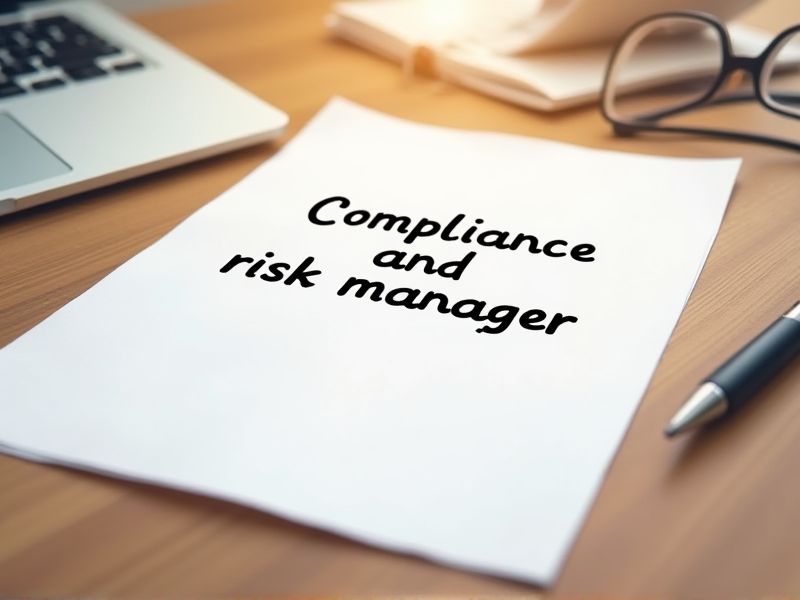
Compliance and risk managers play a crucial role in navigating the complex landscape of regulations and potential threats that businesses face today. Acquiring certain certifications ensures they have the expertise to assess risks accurately and implement effective compliance strategies. Certifications also provide a formal recognition of the professional's skills and knowledge, enhancing their credibility and career prospects. Here are several key certifications that may be essential for a career in compliance and risk management.
Certified Compliance & Ethics Professional (CCEP)
A Certified Compliance & Ethics Professional (CCEP) credential equips compliance and risk managers with a robust understanding of industry regulations and ethical guidelines, enhancing their ability to develop and implement effective compliance programs. This certification demonstrates a commitment to maintaining organizational integrity, which is crucial in mitigating risks associated with legal and ethical breaches. Holding a CCEP title can improve credibility and trust with stakeholders, as it signals a readiness to navigate complex regulatory environments. Certification often results in skill expansion, preparing managers to anticipate and address emerging compliance challenges proactively.
Certified Regulatory Compliance Manager (CRCM)
The CRCM credential equips compliance and risk managers with specialized knowledge to ensure adherence to complex regulatory frameworks. Without this certification, managers may lack the critical understanding needed to navigate evolving legal landscapes, which increases organizational risk. The structured training and rigorous examination process of CRCM validate an individual's proficiency in compliance management systems. A CRCM designation boosts credibility, essential for influencing decision-making and advocacy within financial institutions.
Certified in Risk and Information Systems Control (CRISC)
CRISC certification equips compliance and risk managers with the skills to identify and mitigate IT risks, leading to more secure organizational practices. Companies face increasing regulatory demands, and having CRISC-certified professionals ensures alignment with industry standards. The certification emphasizes strategic business objectives, facilitating effective risk management that supports organizational goals. A CRISC-certified manager demonstrates a commitment to safeguarding information systems, reducing vulnerabilities and potential financial losses.
Certified Fraud Examiner (CFE)
Compliance and risk managers benefit from Certified Fraud Examiners (CFEs) due to their specialized knowledge in fraud prevention, detection, and investigation, which enhances the organization's ability to manage risks effectively. The presence of CFEs helps strengthen internal controls and mitigates potential compliance violations by identifying and addressing vulnerabilities that may otherwise lead to financial losses or regulatory penalties. Their expertise aids in developing robust anti-fraud policies and procedures, ensuring that the organization meets legal and ethical standards. CFEs provide valuable insights into emerging fraud trends and techniques, thus allowing risk managers to proactively adjust strategies and counter potential threats.
Certified Information Systems Auditor (CISA)
The CISA certification equips compliance and risk managers with the necessary skills to effectively identify and mitigate potential security threats within an organization. This certification enhances credibility, which is vital for gaining the trust of stakeholders and ensuring adherence to regulatory requirements. A deep understanding of information systems allows for better alignment of risk management strategies with business objectives. Moreover, possessing a CISA demonstrates a commitment to professional development, which can lead to improved career opportunities in the field.
Financial Risk Manager (FRM)
Financial Risk Managers are essential because they possess expertise in identifying, assessing, and mitigating financial risks, which strengthens an organization's ability to comply with regulatory standards. Their insights into market, credit, and operational risks enable businesses to develop robust risk management frameworks. With increased regulatory scrutiny, FRMs ensure that organizations adhere to compliance requirements, reducing the likelihood of legal and financial penalties. Their proficiency in risk modeling and analysis supports informed decision-making and enhances the organization's resilience against financial uncertainties.
Professional Risk Manager (PRM)
Increased regulatory requirements in the financial sector necessitate expertise from Professional Risk Managers (PRM) to ensure compliance. PRMs bring a deep understanding of risk assessment methodologies, helping organizations identify and mitigate potential threats. The complexity of global financial markets makes strategic risk oversight crucial, a role PRMs effectively fulfill. Improved risk governance leads to enhanced decision-making processes, promoting organizational resilience and stability.
Certified Internal Auditor (CIA)
Compliance and risk managers require Certified Internal Auditors (CIA) to ensure adherence to regulatory standards and internal policies, as their expertise is crucial for maintaining organizational integrity. With their deep understanding of auditing practices, CIAs help identify and mitigate potential risks before they escalate, safeguarding the enterprise from financial and reputational damages. Their certification signifies a globally recognized standard of competence, thereby enhancing the credibility and efficiency of the compliance and risk management processes. Furthermore, the CIA's analytical skills provide valuable insights into improving internal controls and operational efficiency, strengthening the organization's overall risk management framework.
Certified Information Security Manager (CISM)
The Certified Information Security Manager (CISM) designation equips Compliance and Risk Managers with advanced skills in assessing security risks and ensuring compliance with industry regulations. Organizations face a growing number of cyber threats and regulatory requirements, and CISM certification provides focused expertise to address these challenges effectively. By understanding risk management frameworks and security controls, a CISM-certified professional can help in aligning IT security strategies with business goals. The certification also validates the professional's ability to develop and manage an enterprise information security program, essential for maintaining compliance and mitigating risks.
ISO 31000 Lead Risk Manager
Implementing ISO 31000 ensures a systematic approach to identifying, analyzing, and evaluating risks, which aligns with compliance requirements. By prioritizing a framework like ISO 31000, risk managers enhance decision-making processes, leading to better risk mitigation strategies. This standard provides a universal language for risk management, facilitating better communication and understanding across different departments. Adopting ISO 31000 reduces unexpected legal and financial surprises by integrating risk management into organizational processes and governance.
Summary
By obtaining certifications, you enhance your credibility and gain recognition as a knowledgeable expert in compliance and risk management. This often leads to increased trust among colleagues and stakeholders, which can open doors to leadership roles and higher responsibilities. Certified managers have a more robust understanding of industry standards, reducing the likelihood of regulatory breaches. Organizations benefit from your heightened skills, potentially improving their operational efficiency and risk mitigation strategies.
